Citation for Alexander D. Hall
“For outstanding contributions to climate feedback studies on global and regional scales, and to public understanding of climate change”
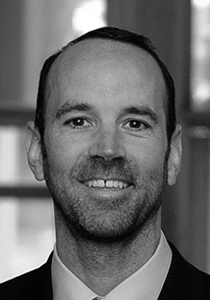
Alex pioneered an approach in using observations to constrain feedback processes in climate models, with profound impacts on the science of climate projection. He laid the foundation for scientific understanding of regional climate of Southern California, addressing such diverse topics as regional modes of variability, land/sea breeze, the Santa Ana winds, and orographic precipitation. Alex has become an outstanding science communicator and public ambassador for climate science, frequently giving lectures at public forums, writing in popular magazines, and testifying at various environment, water, and energy commissions and boards at local and state levels. He was the lead author of a chapter of the 2013 IPCC WG1 5th Assessment Report on climate change science.
An excerpt from one of his support letters reads, “Alex Hall’s pioneering research on emergent constraints initiated an entire field of scientific inquiry. Few climate scientists can claim that their research has had such clear and immediate impact.”
Another one reads, “His article in Playboy magazine is superb—in my opinion simply the best example of a measured, long-term view of the problem facing society. I gave this article to my undergraduate and graduate students for insight, encouragement and inspiration…”
On behalf of the AGU Atmospheric Sciences section, I am pleased to present a 2016 ASCENT Award to Professor Alex Hall.
—William K. M. Lau, President, Atmospheric Sciences section, AGU
Response
Thank you Dr. Lau, for these words and the recognition that goes with them. Thank you to Prof. Kuo-Nan Liou as well, for nominating me for this award. I am deeply honored to receive it. It is amazing to reflect on how many people are involved in developing a person. Too many have helped me to list them all here. But I have to thank my parents and family, for their constant support of me and their consistent encouragement of educational attainment. I have also had some particularly inspiring mentors. My undergraduate advisor Catalin Mitescu introduced me to the wonders of physics, and showed me how satisfying a life of the mind could be. My graduate advisor Suki Manabe introduced me to the exciting world of climate research. He challenged me to meet the highest of scientific standards, and showed me how truly fun climate research can be. I’ve had formative learning experiences working with treasured collaborators, including Amy Clement, Dave Thompson, Steve Klein, and Julien Boé, as well as UCLA colleagues Kuo-Nan Liou, Jim McWilliams, David Neelin, and Katharine Reich. Finally, I’ve surely learned as much from my own graduate students as they’ve learned from me. Thank you Xin Qu, Mimi Hughes, Sarah Kapnick, Neil Berg, Daniel Walton, Alex Jousse, and Marla Schwartz. I’m looking forward to working with many more people and learning from them too, as I continue down this wonderful career path.
—Alexander D. Hall, University of California, Los Angeles
Citation for Christian Jakob
“For outstanding contributions to the better understanding of atmospheric deep convection, and forceful advocacy for the development and improvement of atmospheric models”
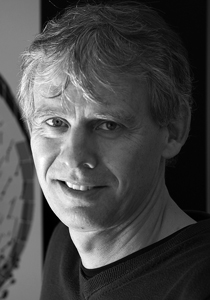
Christian has made groundbreaking contributions to the understanding of atmospheric convection at the process level using observations from weather and research radars, and linking his superb knowledge of weather models to radar observations. He has made crucial contributions to weather prediction model development and model evaluation at the European Centre for Medium-Range Weather Forecasts (ECMWF), and developed numerous improvements to the treatment of clouds and atmospheric convection in the ECMWF models. Christian has demonstrated exceptional leadership in many national and international programs, including WCRP Modeling Advisory Panel, and the GEWEX Cloud System Studies, and as lead author of a chapter of the 2013 IPCC WG1 5th Assessment Report. He has a great passion for training new generations of atmospheric modelers, and has played leading roles in the organization of summer schools, Gordon conferences for mentoring early-career scientists in atmospheric modeling research, and model development.
Christian’s research talents are best summarized in a statement in his nomination letter: “Few scientists can claim such a well-rounded contribution to their field. Dr. Jakob’s work and energy has touched on virtually every dimension of our science, ranging from its intellectual content, to how it is organized, and communicated to the public.”
On behalf of the AGU Atmospheric Sciences section, I am pleased to present a 2016 ASCENT Award to Dr. Christian Jakob.
—William K. M. Lau, President, Atmospheric Sciences section, AGU
Response
I am both thrilled and humbled by receiving this award. I sincerely thank the Atmospheric Sciences section of the AGU for bestowing this honor on me. Thank you Neville, Bjorn, Bill, and Martin for your support in the nomination process.
The award celebrates 20 years of the privilege of being supported by and collaborating with many extraordinary colleagues and friends, too many to name them all. It was Michael Tiedtke and Martin Miller who gave me my start in the field of parameterizing clouds and convection at the European Centre for Medium-Range Weather Forecasts (ECMWF). Without them, I would not have dared to leave the confines of my home country and discover the world. Without them I would also not have developed the passion for trying to apply my work and ideas to improving models. The international nature of the ECMWF enterprise was the ignition charge for my involvement in the many activities of the World Climate Research Programme (WCRP) to which I was allowed to contribute and that shaped me. Thank you WCRP for making me part of the journey. A special thanks goes to the GEWEX Cloud System Study team, which not only allowed me to do better science but also produced several lifelong friendships.
Thank you Peter May for getting me to Australia and for opening my eyes to radar observations. This whole new world turned out to be crucial in developing ideas for future representations of convection in models and it continues to excite me. A special thanks to Michael Reeder for convincing me to come to Monash University and for being a great colleague and friend since my move there. And last but not least, thank you to all my coauthors, especially students and postdocs, for accompanying me on the journey through our science and for letting the rest of the world know about what we do through publications. There would be no award without you.
—Christian Jakob, Monash University, Clayton, Australia
Citation for Eric Maloney
“For fundamental studies enhancing the understanding of the Madden and Julian Oscillations, and their impacts on a wide range of tropical phenomena including tropical cyclones”
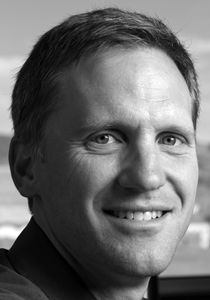
The body of work that Eric conducted in his early career has had a profound impact on the field of tropical large-scale dynamics and convective organization. His papers on the dynamics of Madden and Julian Oscillations (MJO) and relationship to hurricanes in the East Pacific and Gulf region were very influential and form the bases for the development of the real-time multivariate MJO indices that are now routinely used by weather forecasting services in monitoring and predicting the MJO. His more recent work, which covers a wide range of topics including the African monsoon, North American climate, and global climate projections are equally impressive, and highly cited. His scientific leadership is reflected in his very active roles as, among others, editor of Journal of Climate, chair of the NOAA MAPP Model Diagnostic Task Force, and co-chair of the WGNE MJO task force. Eric has been appointed to these positions not only because of his research expertise, but also his unique ability to bring diverse groups to work together in a collaborative way.
Eric’s research talents are best summarized in a statement in one of his supporting letter: “A key strength of Eric’s research is his grasp of the underlying physics. This is especially true in his papers on how the MJO modulates TCs, on the basic mechanism of the MJO and more generally how convection interacts with the large-scale environment. His papers are thoroughly grounded in fundamental physics…”
On behalf of the AGU Atmospheric Sciences section, I am pleased to present a 2016 ASCENT Award to Professor Eric Maloney.
—William K. M. Lau, President, Atmospheric Sciences section, AGU
Response
I am extremely humbled to receive this award from the Atmospheric Sciences section at AGU and to be placed among these highly distinguished past and current awardees. I express my deepest gratitude to Richard Johnson for nominating me, and to Kerry Emanuel, Harry Hendon, and George Kiladis for writing supporting letters. I don’t think that this accomplishment could have been remotely possible without the enormous support I have received over the years from my parents at an early age, as an undergraduate at the University of Illinois where I did independent study with Walter Robinson, in the Department of Atmospheric Sciences at the University of Washington as a student of Dennis Hartmann, through the support of the NOAA Climate and Global Change Program as a postdoctoral fellow at NCAR under the mentorship of Jeffrey Kiehl, and as an Assistant Professor in the College of Oceanic and Atmospheric Sciences at Oregon State University where I had outstanding mentors like Dudley Chelton and Steve Esbensen. I would especially like to thank the current faculty, students, and researchers at the Department of Atmospheric Science at Colorado State University, who have provided an intellectually stimulating and collegial environment that has contributed to my mid-career success. My publication list reflects the numerous collaborators I have worked with over the years across multiple institutions, states, and countries, and I would not be where I am today without their intellectual stimulation, energy, and friendship.
Finally, I would of course like to thank my wife Heather and daughter Isabel. Life as a spouse and daughter of a faculty member at a major research institution is not always easy, and so I owe them an enormous amount of love and gratitude for the patience and support that they have provided.
—Eric Maloney, Colorado State University, Fort Collins
Citation for Adam Scaife
“For his insightful studies in the coupling of diverse components of the climate system, and in improving climate predictions from monthly to decadal scales”
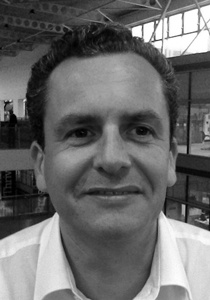
Adam’s research cut across many areas including ocean-atmosphere coupling, stratosphere-troposphere interaction, long-range prediction, solar-atmosphere effects, and climate impacts. His publication record is impressive. Since getting his Ph.D. in 1998, he has published over 100 peer-reviewed papers, with many in highly impactful journals such as Nature, Nature Climate Change, Nature Geosciences, Nature Communications, Geophysical Research Letters, and Quarterly Journal of the Royal Meteorological Society, with more than 10 papers already cited over 100 times.
Adam is well recognized for his research achievements and scientific leadership. He has headed the UK Met Office of Monthly to Decadal Prediction since 2008, and served as principal investigator for several major national and international climate research projects since 2012. He has also led many international programs including, among others, co-chairing the World Meteorological Organization’s international Working Group on Seasonal to Interannual Prediction, and is currently co-chairing the World Climate Research Programme Grand Challenge on Near Term Prediction. Besides research, Adam has an outstanding record in the public communication of science, ranging from lectures to the public and learned societies, to numerous television and radio interviews, and writing popular science books.
Adam’s research talents are best summarized by a statement in his nominating letter: “His work combines a deep scientific insight, a strong background in dynamical climatology, a strong practical outlook and excellent leadership skills—a highly effective combination.”
On behalf of the AGU Atmospheric Sciences section, I am pleased to present a 2016 ASCENT Award to Prof. Adam Scaife
—William K. M. Lau, President, Atmospheric Sciences section, AGU
Response
Thank you so much for this kind citation. It is a great honor to receive the AGU ASCENT Award and the acknowledgement that this implies, and I am truly delighted. Thank you also to the prominent scientists that made and supported my nomination—I am extremely grateful for the time they put aside from their busy schedules.
I am indebted to the Met Office in the UK for giving me the chance to pursue a career in atmospheric science, which I think it’s fair to say is one of the most vibrant areas of terrestrial physics. There is also a whole series of key influential people I would like to thank. Ian James, my Ph.D. supervisor and my colleague Neal Butchart taught me the importance of simplifying apparently complex problems down to their dynamical bare bones, and how careful and concise scientific description feeds back on our understanding to aid progress. Of course there are also the seminal giants of our field like Michael McIntyre who provide a strong background source of inspiration. Just listening to them give talks, or being party to their conversations at meetings sent an enormous cascade of key knowledge my way.
I must also give my deep thanks to Chris Folland, who pulled me out of a pack of keen young scientists and first gave me the opportunity to guide and steer my own research group. I thrived on his enthusiasm, knowledge, and simple straightforward encouragement to think boldly about our research. Similarly, Chris Gordon and Julia Slingo had the vision to see the potential for improving climate models and delivering climate predictions from months to years ahead. They gave me the opportunity and resource to lead this initiative in the Met Office Hadley Centre which was an opportunity that I eagerly took and has since proved successful. Finally, I am indebted to the members of my research group; they make it a pleasure to arrive at work each day and I feel truly privileged to work with such a driven, genuine, and hardworking bunch of down-to-Earth people.
I therefore accept this award with deep gratitude to all of the colleagues I have worked with over the years. As well as the excitement and joy of scientific discovery, it is the great fun I’ve had with the many inspiring and interesting characters over the years that I am particularly grateful for.
—Adam Scaife, Hadley Centre, Met Office, Exeter, U.K.
Citation for Susan C. van den Heever
“For fundamental advances to our understanding of the influence of microphysical processes on atmospheric convection, and feedback processes”
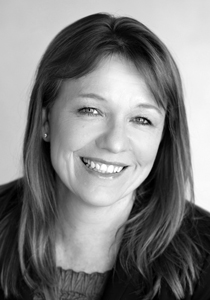
Susan has pioneered our understanding of the effects of aerosol on convection and firmly established herself as the recognized world’s foremost authority on aerosol-convection interactions, even at a relative early stage of her career. Her work and influence on aerosol-cloud interactions go beyond cloud scales, but extend to larger domains and climate relevant time scales such as radiative-convective equilibrium. Her meteoric rise in scientific stature is evident in her very impressive publication record, number of funded research grants, invited presentations, community service, and graduate students she has mentored, all within the last 10 years. Susan currently serves as member, chair or co-chair of no less than five national and international committees, working groups, and advisory panels. Among many awards she has received for her outstanding achievement in research, teaching, and mentoring, she was awarded the prestigious Monfort Professor Award in 2015, presented biennially to only 2 (out of 1400) professors at Colorado State University.
As stated in one of her support letters, “She is a talented scientist, an outstanding educator, an inspiring mentor and role model, and a person of the highest integrity. Perhaps the most impressive trait of all is the quality of mentoring she provides to her graduate students—the hall-mark of someone who will influence and shape our science for years to come.”
On behalf of the AGU Atmospheric Sciences section, I am pleased to present a 2016 ASCENT Award to Prof. Susan van den Heever.
—William K. M. Lau, President, Atmospheric Sciences section, AGU
Response
I am grateful to Dr. Bill Lau and the Atmospheric Sciences section awards committee for selecting me, as well as to those who nominated me. I feel very honored to have won this award.
I would like to thank my dissertation advisor Bill Cotton for imparting his knowledge of cloud systems, encouraging me to become an independent scientist, and for his strong support of my professional development. I am grateful to Graeme Stephens for his mentorship and significant contributions to my career, for teaching me to think big and then bigger still, for sharing his visions of the role of convection in climate, and for providing guidance on the “business” of science.
Sonia Kreidenweis is a trusted colleague and friend. She has provided great insights into aerosol processes and ice structures, and the ways that aerosols and storms regulate one another. Ed Zipser has inspired me through his questions about convection. His love of observations has kept me honest as a numerical modeler. I value Jeff Collett’s thoughtful responses and wisdom, and for supporting my professional development. Thank you to my colleagues at Colorado State University, as well as my other national and international colleagues from whom I have learned much. Special appreciation goes to Liz Page for her support. Finally, it has been my great honor to work with many remarkable students, postdocs, and research scientists who have provided daily inspiration.
I thank my parents, both caring educators, who instilled in me a love of the sciences. I also thank my children, Nikki and Matt, who constantly inspire me with their insightful questions and for their unconditional love. Finally, my greatest appreciation goes to my husband Steve, my lifelong mentor and ultimate supporter, who sees me at both my best and worst and loves me in spite of it.
—Susan C. van den Heever, Colorado State University, Fort Collins
Citation:
(2016), Hall, Jakob, Maloney, Scaife, and Van den Heever receive 2016 Atmospheric Sciences Ascent Award, Eos, 97, https://doi.org/10.1029/2016EO060625. Published on 10 October 2016.
Text © 2016. The authors. CC BY-NC-ND 3.0
Except where otherwise noted, images are subject to copyright. Any reuse without express permission from the copyright owner is prohibited.
